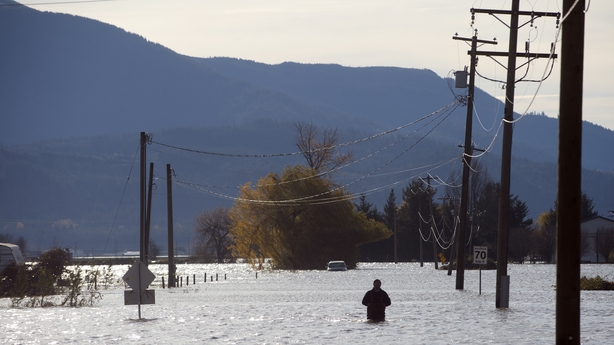Canada is sending the military to help evacuate and support communities affected by «catastrophic» floods with the death toll expected to rise after record rains on the Pacific Coast triggered a state of emergency yesterday.
Heavy rains in British Columbia this week trapped motorists in mudslides that have left at least one person dead and four missing, forced thousands of residents to flee their homes, and isolated Vancouver and its port, officials said.
Canadian Prime Minister Justin Trudeau, in Washington before meeting his US and Mexican counterparts, said the torrential rains have caused «horrific historic floods that have disrupted lives and claimed lives across British Columbia.»
«I can confirm that there are hundreds of Canadian Armed Forces personnel currently traveling to British Columbia to assist with everything from supplies to evacuation to whatever is needed,» he said.
British Columbia Prime Minister John Horgan declared a state of emergency and imposed a travel ban, telling reporters that the «catastrophic» rain, wind and flooding devastated entire communities in our province.
«We expect to confirm more deaths in the coming days,» he added.
The severe weather this week comes after British Columbia suffered record summer temperatures that killed more than 500 people, as well as bushfires that devastated a town.
«These events are regularly increasing due to the effects of human-caused climate change,» said Mr Horgan, just days after world leaders gathered in Glasgow for the COP26 climate conference.

Airlifted to safety
By Tuesday afternoon, the torrential rain had abated. An estimated 300 motorists trapped on highways by mudslides have been moved to safety and a few evacuation orders have been cancelled.
But Henry Brown, mayor of the hard-hit Abbotsford east of Vancouver, said at a news briefing: «We’re not out of this yet.»
«If we have another weather event like we just experienced, we’re in deep weather,» he said.
Meanwhile, the search for more possible victims continues, after the body of a woman was recovered from a mudslide near Lilluitt, 250 kilometers northeast of Vancouver.
Motorist Cathy Rainey told CBC public radio she had seen «the whole side of the mountain going down and out these cars…everything gets swept away. Just a complete panic.»
Canadian police, Staff Sgt. Janelle Schweett, said late yesterday that they had «received a fourth missing person report related to the Lilluitt mudslide.»
As the season’s first snows begin to fall on the mud-covered inland towns and partially inundated, residents scramble for food, heat, and water.
Many grocery store shelves were empty, as disruptions in the supply chain led to panic buying.
Horgan urged citizens not to hoard: «You don’t need 48 eggs. You’ll do dozens, and leave the rest to someone else.»
On the outskirts of Vancouver, cattle have been pulled from hundreds of flooded farms at Somas Prairie – including a cow that was dragged behind a water bike across a meter of water to higher ground.
«We have thousands of animals that have died» and many are in «difficult situations,» British Columbia Agriculture Minister Lana Popham said.
Over night, nearly 200 people were transferred from the area to safety.
Vancouver pieces
Major highways remain closed. As a result, motorists wishing to travel to and from Vancouver have to go south to the United States and back to Canada.
The landslides also cut off rail traffic to and from Vancouver – one of Canada’s busiest shipping ports.
“We are working hard to assess the damage and make sure we can get the supply routes back into shape as quickly as possible,” Horgan said. But conditions are harsh.»
Up to 250mm of rain – what the region usually drops in a month – fell on Sunday and Monday in and around Vancouver, Environment Canada said, which was also hit by a rare hurricane last week.
Meteorologists blamed an «atmospheric river,» or narrow strip of moisture moving from the tropics toward the poles, for the deluge.